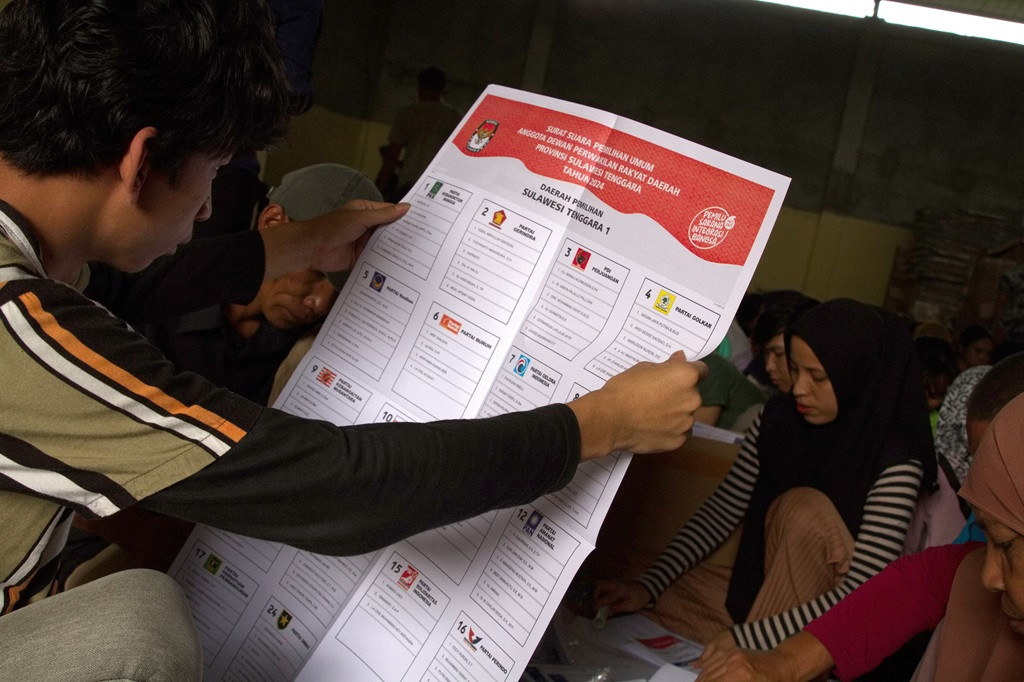Popular Reads
Top Results
Can't find what you're looking for?
View all search resultsPopular Reads
Top Results
Can't find what you're looking for?
View all search resultsLegislative oversight
Assuming a voter knows which presidential election ticket they want to support, they might want to cast their vote strategically by choosing the ticket’s main political party sponsor.
Change text size
Gift Premium Articles
to Anyone

In just two weeks, voters will head to the polls for one of the world’s largest single-day elections. However, many people are still uninformed about how the legislative race fits into the grander scheme of things.
Every voter will have the opportunity to select one presidential and vice presidential candidate pair out of the three options, which is where much of the spotlight has been directed so far, and, for most people, the part that involves the least amount of guesswork.
But voters must also choose a lawmaker to send to the House of Representatives (DPR) and a state councilor to the Regional Representatives Council (DPD), as well as two local councilors, one to serve at the provincial level (DPRD-I) and the other to send to city hall or the regency equivalent (DPRD-II).
Tens of thousands of people – if not more – have signed up to compete for the 20,614 national, state and local legislative seats that are up for grabs. Several opinion surveys found that the ruling Indonesian Democratic Party of Struggle (PDI-P) is the frontrunner in the legislative race, and if the party does well this time, it could repeat its feat from the 2014 and 2019 elections.
Electing strangers to public office is never easy for first-time voters considering how scant the resources are for gauging a candidate’s track record apart from the General Elections Commission (KPU) database.
Fortunately, social media has given us a way to pry open the vast and often opaque landscape of legislative politics and put candidates of all stripes on a more equal footing.

More importantly, however, voters must be aware of the significance of electing the right people to the legislature. After all, any new government that wants to function properly must gain the support of lawmakers.
If an executive government is faced with a legislature composed mostly of opposition forces – as was the case in 2014 – it could soon find it very difficult and costly to honor its campaign promises.
Of course, there are caveats to local legislative elections as there are for regional elections, which must account for the regional dynamics of the political landscape.
But the House and DPD polls are a completely different ballgame.
Under the open-list proportional representation system that Indonesia subscribes to, every vote cast is a vote for both the individual candidate and his or her party platform.
Assuming a voter knows which presidential election ticket they want to support, they might want to cast their vote strategically by choosing the ticket’s main political party sponsor.
However, this way of voting may gloss over the details and individual issues that voters care about.
Alternatively, voters can choose to elect political parties or individuals that best represent their concerns and can hold their own regardless of the government. In any case, it always pays to be well-informed about one’s choices.
Much like the current conversation revolving around the effectiveness of government in President Joko “Jokowi” Widodo’s final year in office, there are signs that House lawmakers are losing focus on their current jobs as politicians switch back into campaign mode for their parties.
Last year, the House failed to meet its annual legislative target, passing just five of the 37 priority bills slated for completion by the end of 2023. It also reported poor attendance, averaging at around 51 percent for plenary sessions held during the October-December sitting period.
The fact of the matter is clear; as voters, we cannot afford to overlook the legislative elections if we want to continue developing into a more mature, merit-based democracy.
An informed electorate is a cornerstone of a healthy democracy, so the onus is on us to ensure that the process is reflective of the will and interests of the people.










